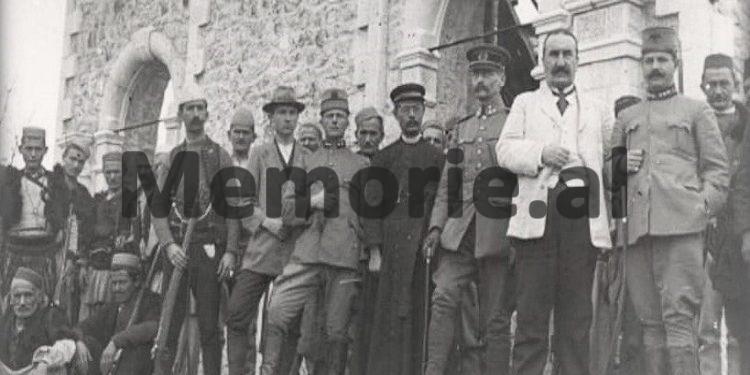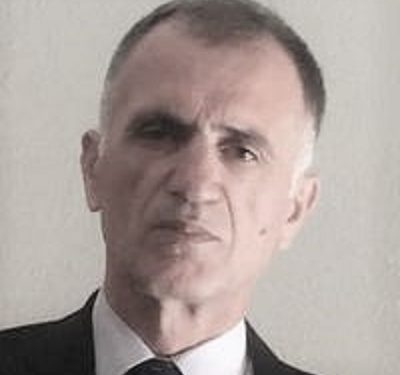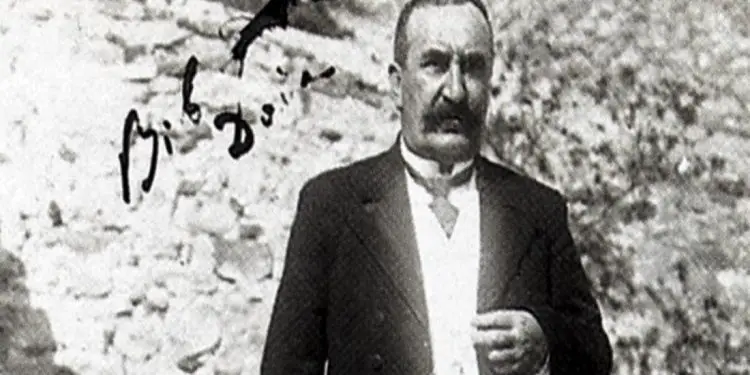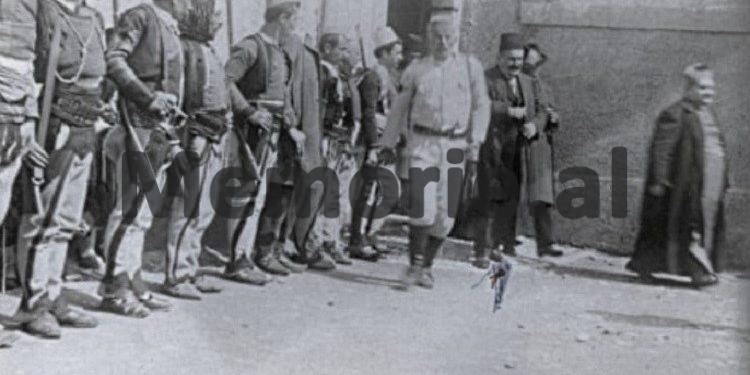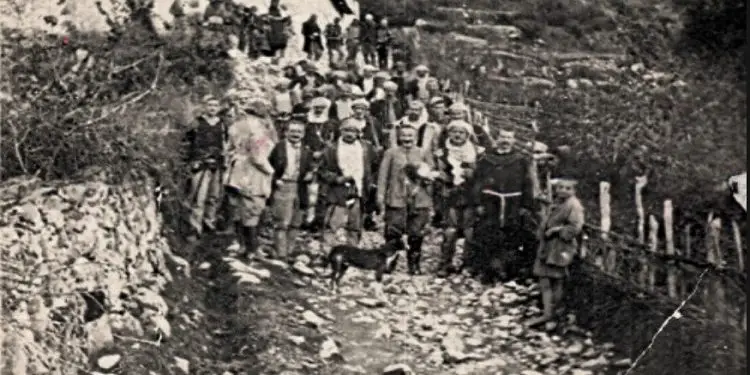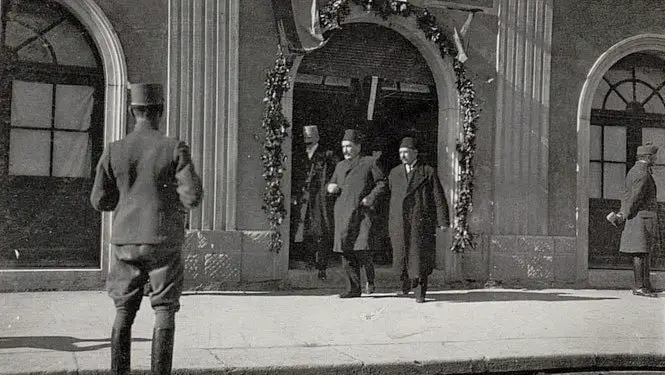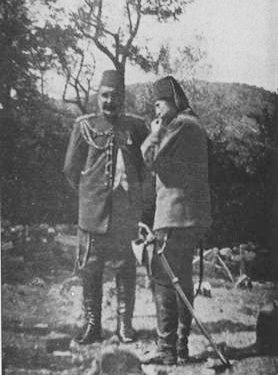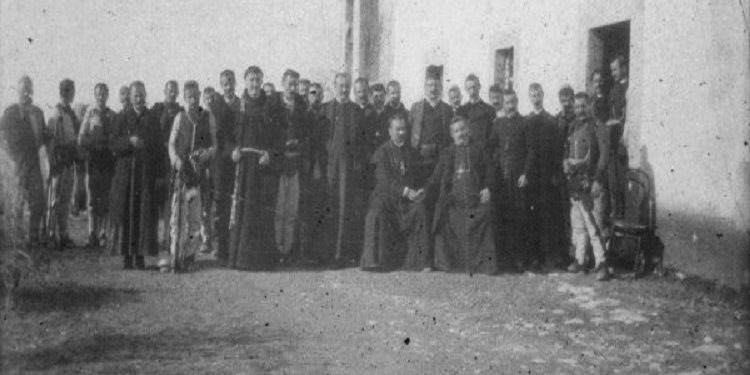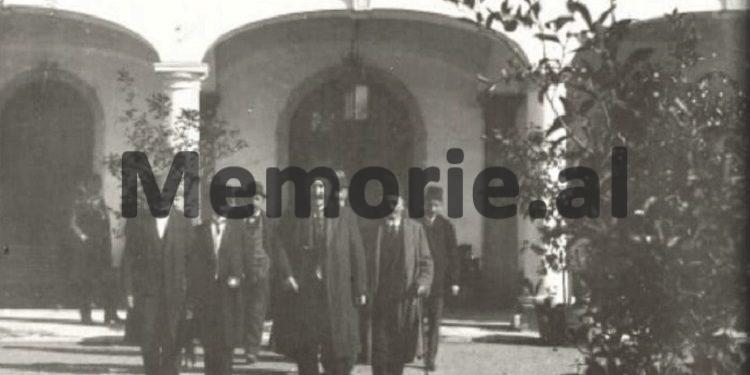By Dr. Nikol Loka
Part twenty six
“PRENGA BIBE DODA, THE SHADOWS OF A CITIZENSHIP”
Memorie.al / The newest book “Prengë Bibë Doda, a phenomenon in Albanian political life”, by researcher Nikollë Loka, not only expands the scope of historical studies on Mirdita, the Door of Gjonmarkaj and the figure of the Mirdita Prince, Prengë Bibë Doda, but it is also a contribution to national historiography. The very rich archival material, the literature used or consulted, oral traditions, etc., make this book a real study treasure, giving the science of history a scientific monograph that enriches our knowledge of Mirdita, its captains, tradition, history etc. To study such an important and complex figure, as the figure of Prengë Biba Doda, is a high scientific responsibility that not everyone undertakes. Nikollë Loka, has done a great job of research and treatment by the professional researcher, giving us the portrait of the Prince and the general Mirditor, with the true contours. Dr. Loka has adhered to the end of the space and time, in which the multidimensional events and their protagonists have developed.
THE MONOGRAPH “ABOUT BIBË DODA, A PHENOMENON IN ALBANIAN POLITICAL LIFE”, A VALUABLE SCIENTIFIC STUDY THAT ENRICHS THE FUND OF OUR HISTORICAL STUDIES
(By Mr. Sc. Murat Ajvazi, March 2017, Switzerland)
The man of hope
In the years after the declaration of Independence, Prengë Bibë Doda greatly increased his fame, as an outstanding leader, in whom people had hopes. In the years following the departure of Prince Vid and the start of World War I, he became one of the most influential figures in the country. His authority had crossed the borders of Mirdita and was talked about in Shkodër, Durrës, Vlorë and elsewhere. Shkodra was put under the control of the armies of the Great Powers through a commission of admirals, since May 1913.
England was represented by Vice Admiral Sir Cecil Burney, who was also Chairman of the Commission; Austria, by Rear Admiral Richard Ritter von Barry; Germany by the captain of the corvette, Mr. Bireman; Italy by Rear-Admiral Patris; France by the warship’s captain, Mr. Pradier. After August 1913, the marines left, giving way to the infantry. The English detachment, “West Yorkshire Regiment” was commanded by Colonel Phillips, with a troop of 400 soldiers; Germany with a body of 300 soldiers, under the command of a major; Austria with a force of 500 soldiers, commanded by Lieutenant Colonel Krailer; France with 200 soldiers, commanded by Commander Roux, as well as Captain Chandaigne, while Italy, with 530 soldiers, commanded by Lieutenant-Colonel Vigliani. The departure of the last two detachments, French and Italian, from Shkodra, caused the government to appoint a new Governor, to whom the Italian Colonel Vigliani should hand over the post. But the Muslims of Shkodra rejected the appointment of Fejzi Bey from Berat (who had been the Minister of the Interior of Ismail Qemali’s Government), as he was from the South and was appointed by Prince Wied.
Turhan Pasha intervened to avoid the outbreak of an uprising in Shkodër, handing over the administration to the consuls of the six Great Powers. At the beginning of February 1914, the Consul General of Austria-Hungary in Shkodër, Halla, in agreement with his Italian colleague, presented the project of nationalization of the Administration in Shkodër. (560)
According to the proposal, Northern Albania was divided into four administrative provinces: Shkodra, Malësia e Shkodra, Puka and Mirdita. In Lezha, which would depend on Shkodra, a Kajmekam would be appointed. In fact, Lezha and Shengjin were administered by officers under the orders of the Commander of the International Forces of Shkodra, but here a provincial commission, headed by Gjeto Coku, had influence. (561)
While in Shkodër, the Local Council was created, consisting of Christians and Muslims. The council dealt with the order and security of the city and the surrounding area (562) and consisted of 6 representatives of each religious community, 6 Muslims and 6 Catholics, prominent personalities of the city in the political and social field, prominent names from the parish of Shkodra, as: Preng Pasha, Sylço Beg Bushati, Shuk Serreqi, Muharrem Kazazi, Shan Deda, Isuf Golemi, Filip Kraja, Myrto Llazani, Ndoc Çoba, Haxhi Hafizi, Alush Lohja. (563)
The City Council governed the city and an area of 10 km. about him. With a letter from representatives of Shkodra, sent to the Great Powers, it was requested that Prengë Pasha take over the leadership of the government. (564) For the governance of Shkodra, a commission was created, to which the two adjutants of Colonel Philips would be attached: the Austro-Hungarian captain, Cvitkovski, and the Italian captain, Fineski. (565)
The issue of the civilian governor of Shkodra had been a very sensitive problem. On May 5, 1914, the Catholics of Northern Albania, with the help of the Bishop of Sapa, Monsignor Nikoll Koleci, submitted to Prince Vid, a memorandum with several demands, which was signed by Monsignor Serreqi, Monsignor Koleci and approximately 10 people from the parish of Shkodra . Prengë Pasha did not sign, etc.
Meanwhile, Catholic intellectuals and clergy addressed a request to the International Control Commission. The first point of this memorandum dealt with the appointment of a governor for Northern Albania, and there appeared the desire for him to be Albanian. Using the religious argument, the signatories of the referendum requested that this governor be of the Catholic faith, clearly alluding that this person should be Prengë Biba Doda. (566)
Thanas Floqi, who had lived for eight months in Shkodër at that time, appreciates his work. “In 1914, you were in Durrës, in the service of the Ministry of Justice where I served for some time, by royal decree you were transferred to the court of the Prefecture of Vlona, as a judge and I served there for a few months, until the power of the insurgents was reduced on the edge of Viosa, he started walking over Vlona. Then, we saw that you don’t have to stay there, I got on the steamer and went with many other friends to Shkodër. As early as in Vlora, I made a promise to go together with the deceased martyrs, Mustafa Qulli and Sali Nivica, and we lived there for eight consecutive months, shared a shelter and together with them, I enjoyed the black and white days in the capital of Teuta, in those eight months. Shortly after we went there, the fraternal war broke out between the Christians and the Muslims, of whom, the former wanted to keep the national flag and the latter wanted to join the insurgents and raise the Turkish flag in the castle. There would almost never have been a fight between them if Prengë Bibë Doda had not intervened and fixed things. The ruling commission of Shkodra, shared the presidency of Bib Doda, decided qi; instead of the flag with a flag, a red and black flag was raised, so neither the Muslims nor the Christians were satisfied, both sides were satisfied. With this repair, the rifle went straight and a promise was made to Saint George. The knights had two sacred tasks; they saved the honor of the flag, they didn’t even let the Muslims behave against us, as we were coming from other cities of Albania so as not to fall into the hands of the insurgents. Surprisingly, since we were from Bregu i Mati, the people of Shkodra called us “Toske”. Speaking generally about the Muslims and citizens of Shkodra, we have the duty to mention that neither all Catholics nor all Muslims participated in this movement, among whom there were even at that time many respectable patriots” . (567)
In this period, Prengë Bibë Doda has become everyone’s man. The successes of his work in Shkodër influenced other northern regions to look at him. Thus, in an assembly held in Kumbull i Fani, where representatives of 12 bajraks of Mirdita and three of Drini took part, by means of a letter, Prengë Pasha was asked to intervene with the foreign consuls, for the departure of Serbia from the Albanian lands. (568)
Finally, Prenga had taken an openly anti-Serbian stance. In a letter to Baron Nopça, he writes: “The Serbs left Albania in such a flash that everyone has been left stunned. It is certain that on this side of the border, there is not even a single Serb. We didn’t manage to fight them at Fana, but thankfully, the Serbs left their positions while I was there and the Turks didn’t. So we parted as friends. But I don’t want to see them again, because they are completely unbearable people”. (569)
From this letter we understand that Prenga had moved in his positions, and there is no way it could have happened otherwise, because the political reality in the country dictated such a position.
At the head of the Ruling Commission of Shkodra, Bibë Doda, requests that the territory not be taken from the Montenegrins, when they entered Shiroka. (570) when the Montenegrins violated the Albanian territory, he protested to the foreign consuls in Shkodër and demanded that measures be taken, so that these actions would not be repeated. (571) on this occasion, with minor exceptions, all the emigrant patriots were arrested in Shkodër. (572)
At that time, Shkodra was under the influence of many well-known patriots who had come to this city. But the Montenegrins, after entering Shkodër, no longer wanted to have these patriots under their feet. On this occasion, they killed the patriots Çerçiz Topulli and Muço Qulli and interned the others: on June 8, 1915, Prengë Bibë Doda, Aqif Pasha Elbasani, Seid Pasha, Luigj Gurakuqi and Fejzi Bey Alizoti were interned. For six months, they were forced to stay in Cetina, under isolation measures. (573)
In those difficult moments that the nation was going through, Austria was the best ally of the Albanians, because it was the enemy of their enemy, and the Austrian contribution to the Albanian cause had been greater than that of any other nation. When the Austro-Hungarian troops entered Montenegro and Albania, they addressed the Albanians with two proclamations:
“Dear brotherly loyalty Albanians! There was no need to repeat with you all those miseries and hardships that our people have experienced for so many years under such a savage and incorporeal father, who was leave us, not with tears and longing, but also the lives of our brothers and sisters and neighbors. The Venerable Austro-Hungarian Monarchy, with an immeasurable power, grants me so many victories in wars against these enemies, in favor of its own rights, and does not spare us the rights of others. ona, for the revival and progress of our nation. Brother Albanians! Among these unforgettable days, as the Austro-Hungarian armies with an immeasurable bravery, as many victories in wars against their enemies as they have, and they are also our enemies, so our Albanians united m A mind and a heart, regardless of religion, have the duty to wait for the Austro-Hungarian army, as guards and liberators, and they will be obliged to help this Baamiris for development as well as for the well-being of the motherland ‘We. Albanians! We made the difficult ones ours, we tried them together, until the day came when everything was taken away together, I worked under the ruling family of the Austro-Hungarian army. Let us not forget, ours, the years of care and kindness of the Austro-Hungarian armies, who, having shed their blood for their freedom, should be forced together, according to the bookseller’s orders. ours, with baa njat loyal feelings, qi sod of us begs. Prengë Bibë Doda, General Seid Pasha, Aqif Pasha, ex-minister, Feizi Bey, ex-minister, Luvigj Gurakuqi, ex-minister. (574)
Proclamation
Albanians
Brother Albanians!
There is no need to bring to your mind all the evils and miseries that our nation has suffered in these last three years, under the barbaric yoke of our friends, who, not only killed our brothers, kidnapped our possessions and deserted them our years, but they tried with the most savage and inhuman ways to completely wipe out our tribe from the face of the earth. Their friends, they did not only work for the loss of our nation, but also wanted to work for the dam of the Conquerable Kingdom, Austria-Hungary, which, since old times, has held us with one hand over our heads, You have shown hourly and hourly, to the Albanian nation, its great kindness and, in every case, you protect our existence and the sacred rights of our nationality.
So, in these unforgettable days, in which the armies of Austria-Hungary, from victory to victory, broke and defeated their own enemies, who were also their enemies, they joyfully enter the years of We, in order to protect the freedom of our nation, all Albanians, regardless of religion or party, have the duty to welcome these honest Austrians as saviors and not only to serve them, but also to serve them.
Compatriots!
We, who in these last years, have shared with you the evils and the sufferings, again, let us begin with you, who set the example by suffering once and completely under the command of the Austro-Hungarian Authorities. You too should not show any doubt, if you hurry to show the honor and gratitude to the Austrian-Hungarian allied armies, which are shedding their blood, for the salvation of our freedom, you will be ready with me serve faithfully before us, according to the orders we will receive.
From Cetina on April 28, 1916
Preng Bibdoda Feizi Alizoti
Seid Pasha Luigj Gurakuqi
Aqif Pashë Albasani. (575)
Being a well-known politician, Prenga put forward the idea that efforts should be made to form a national government, which, regardless of the situation of occupation, would serve as a moral authority and representative of the Albanians, in relation to the foreign powers that were established in place. This proposal, it seems, did not find much support in political circles, but it was supported by representatives of the Italian state, who proposed giving aid without implementing it as a project. In relation to this political movement of Prengë, the newspaper “Populli” writes: “Prengë Pasha, you tried too hard for the formation of a general government, starting from Shkodër. His Highness Preng Pasha, ast tuj met a little opposition from some. We remind us that the patriotic will and unwavering will of Kapidan Pasha is enough to put up a fence against all the difficulties and to protect the Motherland from unreasonable risks”. (576)
In relation to this proposal, in another article of the newspaper, it is written about the trip to Rome of the Italian consul in Shkodër, De Faccendis, to convince his government to influence the formation of the Albanian government, and to renounce Assad, who is endangering the lives of Albania and Italian politics. It seems that the consul managed to convince his superiors, since the Italian government gave two and a half million francs for the formation of the government, but set some conditions. In the instructions of the Minister of Foreign Affairs of Italy, Sonino, it is written that; “For the Catholics, Bibë Doda is thought to be a suitable person, who during the period of the Austrian occupation, held a dignified position in Shkodër and with the prestige he enjoys among the Mirdites and the highlanders, can bring a contribution of strength”. (577) Memorie.al
- FO.371/1891, doc. No1542, Report of Consul General Lamb to Sir Edward Grey, Vlorë 4 January 1914, p.393, see Romeo Gurakuqi, Albania 1911-1914, p.704
- Romeo Gurakuqi, Albania 1911-1914, p.713
- HHStA-PA-A, Year 24-41-4117; Luan Rama, the tragicomic operetta of a Prussian prince in Albania: the study of Mr. Luan Rama is accompanied by a short summary by Ben Andoni] Courier. – No. 311, December 30, 2004, p. 19.
- Sejfi Vllamasi, Political encounters in Albania (1897-1942), Tirana: 1995, p. 93.
- “Lidhja Kombatare” newspaper, June 14, 1915
- Romeo Gurakuqi, Albania 1911-1914, p.704-705 566. Romeo Gurakuqi, Albania 1911-1914, p.717
- Lef Nosi, Historical documents 1912-1918,… p. 302-303568. AQSH, Prengë Bibë Doda Fund, File 5, p.1
- Franc Baron Nopça, Travels through the Balkans, Pleiad 2007, p. 472
- “Populli” newspaper, May 17, 1915
- “Populli” newspaper, May 11, 1919
- Sejfi Vllamasi, Political encounters in Albania, p.93
- Lef Nosi, Historical documents 1912-1916, p.244-245
- Lef Nosi, Historical documents 1912-1918, …p. 244-245
- Lef Nosi, Historical documents 1912-1918, … p.245-246
- “Kombi” newspaper, April 23, 1915
- The Albanian People’s Struggle for National Liberation (compilation of documents), Tirana 1975




